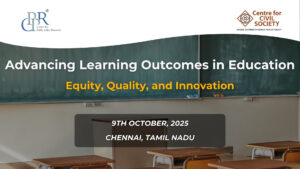Advancing Learning Outcomes in Education: Equity, Quality, and Innovation | Edupreneur Roundtable at Chennai

Book Release – Dr Gopinath Panangad’s “Scandinavian Greeshmam” | CPPR
September 16, 2025
Advancing Learning Outcomes in Education: Equity, Quality, and Innovation | Edupreneur Roundtable at Bengaluru
October 8, 2025Advancing Learning Outcomes in Education: Equity, Quality, and Innovation | Edupreneur Roundtable at Chennai
| Event Start Date: October 9, 2025 | Event End Date: October 9, 2025 | Event Venue: The Harrisons Hotel, Chennai |

Edupreneur Roundtable at Chennai – Stakeholder Discussion
Overview
Tamil Nadu has made impressive progress in expanding access to education, yet learning outcomes remain below desired levels. The National Assessment Survey 2025 reveals that only 20% of Grade 6 students can identify basic fractions, and just 27% of Grade 9 students understand number sets — underscoring a widespread learning gap that transcends rote learning.
Among the state’s 57,935 schools, 65% are government-run, 14% aided, and 21% unaided private institutions, together serving over 12 million students. Despite this scale, low learning outcomes persist across all school types — government, aided, and private — signalling a systemic challenge in pedagogy, curriculum, and regulation.
Teacher shortages, limited training, and outdated curricula further compound the problem. Addressing these requires collaborative reform involving policy, technology, and community engagement.
To advance this dialogue, the Centre for Public Policy Research (CPPR), in collaboration with the Centre for Civil Society (CCS), is hosting the Edupreneur Roundtable at Chennai, bringing together government officials, educators, civil society representatives, and school leaders to develop actionable strategies for improving learning outcomes.
The roundtable is part of the CPPR project, “Easing the Regulatory Ecosystem of School Education in India.“
Objectives
-
Facilitate Multi-Stakeholder Dialogue: Connect policymakers, think tanks, and educators to discuss strategies for improving educational quality.
-
Identify Policy Gaps & Recommend Reforms: Examine regulatory barriers and propose solutions for effective quality enhancement.
-
Promote Technology Integration: Share best practices and address challenges in adopting digital tools in schools.
Panel 1: Bridging the Learning Gap
Discussion Points:
-
Role of low-fee private schools (LFPS) in expanding access and ensuring sustainability.
-
Curriculum, assessment, and regulatory frameworks—support or barriers to learning outcomes.
-
Rethinking teacher development amid qualification mandates and training gaps.
-
Redesigning performance monitoring to focus on real learning, not just compliance.
Panel 2: Leveraging Technology in School Education
Discussion Points:
-
Enhancing engagement and foundational skills through digital tools.
-
Balancing innovation with regulatory compliance and content standards.
-
Ensuring equitable access to devices, connectivity, and digital literacy via public–private partnerships.
AGENDA
Thursday, 9th October 2025
10:30 a.m. — Conference Begins
10:30 – 10:45 a.m. — Welcome Address by Dr D Dhanuraj, Chairman, CPPR; Presentation by CPPR Team
10:45 a.m. – 12:15 p.m. — Session 1: Bridging the Learning Gap: Understanding Causes, Challenges, and Strategies for Better Outcomes
Key Discussants
- Thomas Antony, Senior Manager (Education Policy Reforms), Centre for Civil Society (CCS), New Delhi
- Praveen Rai, Principal Consultant, Technical Solutions, CEGIS
12:15 – 12:30 p.m. — Break
12:30 – 01:30 p.m. — Session 2: Leveraging Technology in School Education
Key Discussants
- Vijaya Ruby Malan, Ed-Tech Evangelist, Zoho & Head, Zoho School of Business
- Florence Johnson, Education Specialist of Opportunity EduFinance
1:30 – 2:00 p.m. — Lunch

